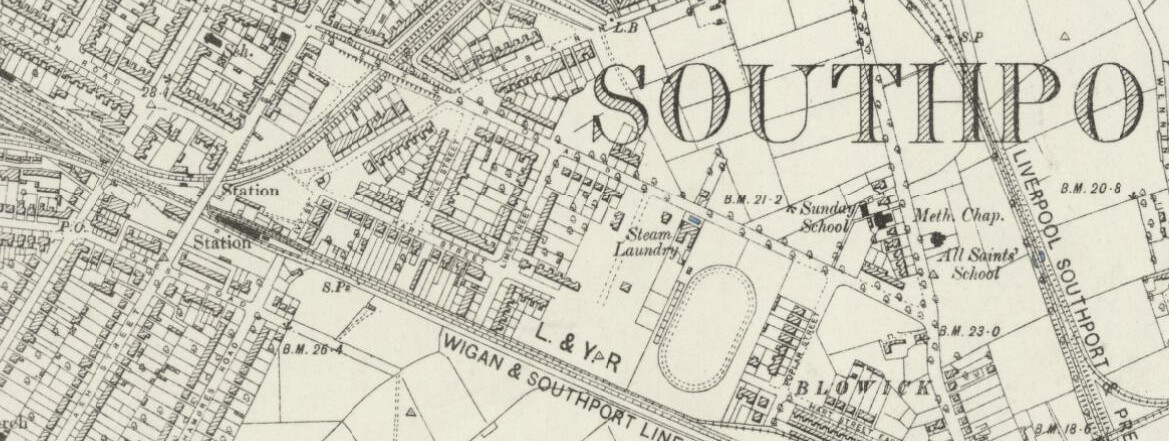
In the summer of 1888, the year the Football League was founded, with the game increasing in popularity, it was felt that a team of stronger calibre should be formed to represent the district. On 2nd June 1888 the Southport Guardian newspaper revealed that there was a scheme in the town to provide a football club of ‘mighty proportions’, by raising an importation team.
The idea met with favour and the initial meeting called to form such a club took place on 12th June at Victoria Galleries, Chapel Street. Professional football was about to be launched in Southport
At a second meeting, held at the Railway Hotel a week later, Mr. Robert McGown (erroneously reported in the Guardian as “McGowan”), once secretary of the High Park club, successfully proposed that the name of the club should be “Southport Central Association Football Club”.
When the proposition to form a committee was put, eleven voted in favour, none against, and nineteen abstained. Mr James, of Hoghton Street, was appointed Honorary Treasurer, Edwin Ramsbottom Secretary and an Executive Committee was formed. A resolution was passed “that the Executive Committee be requested to orqanise and canvass for subscriptions necessary to defray expenses of the club during the coming season and that they incur no liability in excess of assets without the authority of a General Committee”. The Ratepayers Association donated five guineas and more than £50 was collected altogether.

At a meeting held on 29th August, Mr. J. B. Watson explaining the objects of the club said it was likely to place Southport in the front rank of football with the certain result of bringing increased crowds of visitors to the town and it was confirmed that “Foreign talent” would be introduced by paying players.
Two teams were put into the field, the Reserves being known as Southport Swifts, and the first team consisted of both local and professional players with a strong East Lancashire element including Walsh and Ackroyd (Blackburn Olympic), Mullins and Duncan (Halliwell) and Joe Sourbutts ( Blackburn Rovers).

The Sports Ground in Sussex Road was hired and on 1st September 700 spectators assembled there for the visit of Stanley a Liverpool club, who prevailed 4-1. The Southport team was: Tyldesley, Walsh, Aitken, Taylor, Horton, Ackroyd, Duncan, Sourbutts, Lea-Jones, Farrar and Graham. Goalkeeper Lewis Tyldesley was a bell ringer at Christ Church for more than 50 years.
In their first excursion in the F.A. Cup Central were drawn away at lrwell Springs, winning 5-4 after extra time, before being hammered 7-1 at South Shore to the disappointment of the 200 supporters who travelled from Southport. Nevertheless the club took their defeat well and entertained the team and referee, Sam Ormerod of Accrington, to tea at the Palatine Hotel, Blackpool, after the game.
In their first season Southport Central often experienced difficulty in arranging fixtures and when they applied for matches some clubs treated them rather curtly. Lytham simply wrote on the memorandum bearing Central’s application ‘We do not know this club!’ and returned it to their secretary.
Rivalry amongst the local clubs remained intense. After Central had defeated Haydock St. James 4-1 in a Lancashire Junior Cup tie an anonymous correspondent from Southport informed Haydock that Central had played an ineligible player. An inquiry found that there was no truth in the allegation but it typified the ill feeling that existed. Central reached the fourth round of the Lancashire Junior Cup before losing 2-0 at home to Fleetwood Rangers.
A fortnight later Southport and High park clashed in the Charity Cup. The ‘Parkites’ had won 4-3 at Sussex Road on New Years Day before 2,000 spectators. A record gate of 2,500 assembled at High Park’s Devonshire Road enclosure. When Hill gave the home side the lead the Southport Visiter remarked ‘the shouts and cheers that followed the goal must have been heard miles away’ Taylor equalized but Central had to thank Ingram whose brilliant goalkeeping kept them in the game. The replay was fixed for the following week. Sensationally, High Park scratched from the competition due to the fact that full-backs Fairhurst and Caldwell were injured. Local pride was at stake and High Park were not prepared to play a weakened side even if Infirmary funds suffered. Central defeated Churchtown 4-1 in the final.
In December the Athletic News commented ‘that football is looking up in the pleasant sea port whose only defect is being without the sea’. However, the game was still in its early stages and disputes regularly occurred. These were often resolved by the captains. Ackroyd, the Central captain almost withdrew his men after half an hour in a match against Heywood due to the referees one sided decisions but they stayed only to lose 3-0. In the return game the entire Heywood team left the field disputing Central’s goal scored by Horton. Southport, although trailing 2-1, claimed the match.
The club’s record for their initial season was Played 40 Won 21 Drawn 6 Lost 13.
The event which caused the most excitement in the town was the visit of Preston North end who had just carried off the League and Cup double. They came to Southport on 13th May and were given a rapturous welcome on arrival at the railway station. They were driven to the ground behind a marching band. There was a record gate of 3,500 and North End won 4-2 even though Central were re-inforced for the occasion by Forbes, Townley and Southworth of Blackburn Rovers.

You can read the full story of this exciting period of the Club’s history in the new book, ‘The Town’s Game: The Origins of Rugby and Association Football in Southport (1872-1889)’
You can listen to an audio summary of this story on the Grains of Sand Podcast:

 2 - 1 v Kidderminster Harriers (H) 26/04/2025
2 - 1 v Kidderminster Harriers (H) 26/04/2025 


